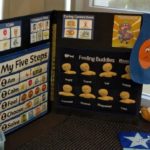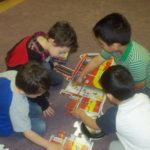Children who have difficulty managing themselves and their emotions have a hard time learning “school skills” and cause those around them to have a hard time.
WHAT IS CONSCIOUS DISCIPLINE AND WHY DO WE USE IT?

Because of the growing number of children with serious social-emotional problems disrupting learning, ACHR education staff searched for a way to help teachers help children learn effective social-emotional skills. ACHR began using the Conscious Discipline® program in 2011. Because of its success in helping many of our children, despite a steep learning curve for staff, and hours of training required ACHR continues to use this program.

One of our goals has been to share information about Conscious Discipline® with others who serve children in our area and across the state and to encourage them to use the program. Some elementary school staff are noticing our children’s skills and beginning to look at this program. The Alabama Pre-K program has adopted Conscious Discipline. This past spring the Alabama Department of Early Childhood Education partnered with us in offering a Conscious Discipline ® parenting course to parents.

Conscious Discipline® (CD) is a comprehensive, trauma-informed, brain based self-regulation program. What is self-regulation? It can be easy to confuse self-regulation with self-control. The two are related, but not the same. Self-control is primarily a social skill. Children use it to keep their behavior, emotions and impulses in check. For example, a child who wants another child’s candy keeps himself from grabbing it.
Self-regulation is a different and more complex skill. It allows children to manage their emotions, behavior and body movement when they are faced with a situation that is tough to handle. In addition, it allows them to do that while staying focused and paying attention. Children learn how to figure out that they need to calm themselves down when they get upset. They learn to be flexible when expectations change and resist giving in to frustrated outbursts. For example, a child who is upset about being teased keeps herself from hitting the person teasing her. She learns there are a variety of ways to solve her problem, such as breathing to stay calm, words she can say to help solve the problem or asking an adult for help. Or a child who could be distracted by the many sights, sounds, and materials in the classroom learns how to stay focused in order to complete the task he/she started.
Self-regulation develops over time. That is why it is much more usual to see a 4-year-old having a tantrum than a 12-year-old. If a 12-year-old regularly has tantrums, he likely has a problem with “self-regulation.” (understood.org)
CD provides adults ways to learn new skills and behaviors to help them feel safe, connected, and empowered. These adults then can create a positive environment for the children, families, and community served and teach children important social-emotional skills that positively impact both social and academic success. Teachers learn to create a “healthy school family” in their classrooms. A healthy school family helps children feel safe (physically and emotionally), secure and connected so the classroom becomes a supportive place to learn.
Activities of the school family include daily greetings and a “brain smart start,” wishing others well, creating and adding to a “friends and family board” and learning to be helpful and safe. Children have daily “jobs” (such as setting the table) that help them learn how to be a part of a community and feel needed.
Children learn positive ways to handle upset and conflict as they occur. They learn and practice using words to let others know how they want to be treated.
Other parts of Conscious Discipline that encourage development of self-regulation include consistent schedules, pictured classroom rules and schedules, and times/places to practice social skills that are being learned.
Parents are their child’s first teachers, so Conscious Discipline ® offers a parenting curriculum. This program is a comprehensive approach that helps parents learn skills that create a safe, connected, problem-solving environment in the family. Watch our web site for opportunities to participate.